|
I’ve been busy working on a couple stories, so I wanted to share with you one of my previous posts that I hope you enjoy.
Handwritten “Thank You” notes are among my most prized possessions from my days with the Cubs. I don’t know why. I’m guessing it’s because someone took the time out of their day to recognize that a human being did something nice for them. I’m also guessing it’s because my handwriting is horrific. As my wife has told me from time-to-time, I have the handwriting of a serial killer. That’s probably why I tape record my interview subjects – as there’s little chance I’d be able to read my own writing. Unfortunately, I didn’t keep all of the “Thank You” notes in one place – which makes it difficult when you know you want to tell a little tale about this one letter in particular. It took a while – as it was actually in a lock box – but I found it. Back in the day, one of the great perks of working for the Cubs was getting to meet lots and lots of interesting people – especially in the entertainment industry. Perhaps you’ve heard that the Cubs are somewhat popular?! Anyway, through a friend of a friend, I was fortunate enough to meet Eddie Vedder, spend quality time with him on multiple occasions, and see him and the band perform many times. In my Media Relations career, I would send him media guides and Season in Review end-of-season booklets. In the fall of 2001, Eddie asked if I could send him an extra Season in Review. He was going to be spending a lot of time in Los Angeles with a friend of his who was a huge baseball fan. Eddie went on-and-on about his friend, and said this guy would read it cover-to-cover and get a big kick out of receiving it. I didn’t think anything of it. Of course, I sent the extra book to Mr. Vedder to give to his friend. Happy to do it! Honestly, while I list Pearl Jam at the top of my personal “music influencers” chart, I didn’t really connect the dots as to who influenced my music influencers. Eddie had told me the name of his friend that he was hanging out with, but that was the guy’s pseudonym. I didn’t put two-and-two together and track down the real name. So when I received a letter a few weeks later … with a baseball as a return address label … and a postmark of Hollywood, CA … I had no idea of what I was about to open. The lightbulb didn’t go on for me when I read the name of the sender on the address label – John Cummings. I just figured it was a random note from a fan asking for something. I had no idea that was the real life name of the New York-born musician who was one of the great guitarists of all-time. It wasn’t an “Ask” note. It was a “Thank You” note from a huge Yankees fan. And when I saw the signature at the end of the letter, the goose bumps raise on my arms the same way now as when I read it for the first time in 2001: Dear Chuck, Thanks for the “Season in Review.” It was a very good season for the Cubs. The Yankees need to make some changes, increase their on-base percentage and slugging but I’m sure they will. Eddie is working on his autograph 8 x 10 Cubs collection, he has about 400 different Cubs players. If there is ever any “Ramones” items you need let me know I’d be happy to help out. Thank you again for thinking of me. Yours truly, Johnny Ramone I don’t know what’s more awesome – that Johnny Ramone sent me a Thank You note or that THE Johnny Ramone actually thought about writing me a Thank You note. In any case, I’m so glad I have it.
1 Comment
HEY?! HEY?! HEY?! HEY?! HEY?! WHAT IS GOING ON HERE?! OK … that was too easy. How do you write about Dennis Haskins – who you and I both know as Mr. Belding – and not go straight to his catchphrase? Well, here’s the story behind the story. Last year, I began writing for the University of Tennessee at Chattanooga’s Alumni Affairs department. On my first-ever trip to Chattanooga, I was invited to a ceremony honoring Haskins, a UTC alum, who was making a sizeable contribution to the university’s library – his scripts from the “Saved By The Bell” series. Haskins played Mr. Belding, the principal on “Good Morning, Miss Bliss,” “Saved By The Bell,” and “Saved By The Bell: The New Class” from 1987-2000 – a run of nearly 250 episodes. After the ceremony, I was introduced to Haskins. We exchanged pleasantries, we took a picture together (which I’m including for your viewing pleasure), and we started the process of setting up an interview – which we later did for UTC. During ensuing conversations, I learned about his love of music – and his love of baseball. I knew at some point I would want to share that with you. You see, he gets invited to attend minor league baseball games – as Mr. Belding. During summer months, he can be found on the Mr. Belding Minor League Tour, where he goes to minor league parks across the country and does autograph signings, VIP meet-and-greets, and the 7th-Inning Stretch. Playing a principal in a family entertainment show has the fans lining up to meet him. We recently talked by phone; Dennis was in New York – the day after Mr. Belding attended a Hudson Valley Renegades game (Hudson Valley is a team in the Class-A New York-Penn League). Thanks to Facebook and Twitter, I see you all over the place. Tell me about the Mr. Belding Minor League Baseball Tour. Dennis Haskins: “I'm invited to go. It's a wonderful thing. The really nice thing for me is that ‘Saved By The Bell’ was family entertainment. Parents could let their kids watch and not worry about what was being said. It was enjoyable for kids and a good moral was portrayed every episode. “And minor league baseball is family entertainment. I've been to over 90 ballparks, and every ballpark wants to make sure that not just, quote, ‘the fans’ – but the fans and their kids have a great time at the ballpark; that it's a whole experience for them. From having kids parade around the outfield before games and having first pitches thrown from a variety of people to in-game between-inning contests, it's really a fun time so families come back. Because as you well know, players come and go. “I met a guy by the name of Erik Haag a long time ago, and he was the general manager of the Southern Illinois Miners baseball team in addition to some other stuff. And I was talking about a karaoke CD. His holding company had a record label, but he said ‘Why don't you come to the ballpark because I think the fans would like to meet you, and you can do karaoke afterward?’ “Well, Erik and I now have worked together for over nine years, and that's how it began, just randomly. But it's really been a wonderful relationship with me going to the ballparks and meeting the fans. Lines lasting from the 2nd through the 6th inning that you've got to cut off because I do the 7th-inning stretch with kids on the dugout. I let the kids sing, do it a la Harry Caray, ‘A one, a two, a three.’ And by the way, last night I was in Hudson Valley with Josh Caray, Harry Caray's grandson – who was doing the games. How about that? Anyway, it's just a wonderful, wonderful experience for me, too. “You know, Chuck, how can you not enjoy having person after person after person walk up to you with a big smile on their face and telling you they’re glad to meet you? Telling you that you helped raise them. Telling me about their favorite episode.” Of the places you’ve been able to visit, what's your favorite ballpark? “You know, I can't pick. I'll tell you why. Because there are Triple-A ballparks that I can go into this year; for example, I’m going to Columbus for my fourth year in a row. Then there's A-ball like the (Hudson Valley) Renegades. “There's a different level of competition at every ballpark, but the experience for the fans is the same. Regardless of what the physical plant is, everybody that I've met associated with minor league baseball loves the game. They love to be part of it, from the interns to the presidents of the clubs to the general managers. I mean, it's really something. It's really something to see, it really is.” I know you sign autographs, you throw out the first pitch, you sing the 7th-Inning Stretch. Do you have any memorable stories to share? “I have a pretty cool first pitch story that I like to tell. When Steve Gliner was down in Fort Myers, he brought me to down there for a Fort Myers Miracle game a few years ago; they were part of the Twins organization then. Paul Molitor was down there working for the organization, and he actually knew ‘Saved By The Bell,’ which blew me away. “So I'm out throwing the first pitch, and everybody's waiting, and I bounced it. And that's the cardinal sin of throwing first pitches. And I said, ‘Give me the ball back,’ to the catcher. And I threw it again – and I threw a strike. So as I'm walking off the field, and as only Paul Molitor could say, he said to me, ‘Life's about second chances, son.’ It was just so nice of him. He's a Hall of Famer and he took the time to make me feel better for throwing two pitches, you know.” When I was in Chattanooga I visited the legendary Engel Stadium. Growing up in Chattanooga, did you get to a lot of games there? “Engel Stadium, when I was a young guy, was a Twins franchise. Harmon Killebrew came through and played there, but I did not get to see him play. But I was a member of Joe Engel's Knothole Gang. And for those of you that don't know, a knothole is what kids used to look through from the outfield so they could see the game without having to pay. So that was a cool thing. “And cut to the '70s when the stadium wasn't being used anymore. It was used for ‘42,’ the Jackie Robinson story. So it's had some film work, but it wasn't being used. And Atlanta and Nashville had summer concert series they did for free, and I thought, ‘Why not us?’ And this kid, who was a member of the Knothole Gang, Dennis Haskins ... To cut a long story very short, I was in charge of this series of ‘Concerts in the Park,’ I had the keys to the stadium. I would open it up and I would close it down. Me and Engel Stadium; I get chills all over me, man. Just us. What an amazing thing to be in there by yourself with all those memories of people that had come and gone, all those hopes and dreams, all the fans that had come to the games. How can you not love that? I don't think I've told that to too many people.” Major league game or minor league game: Which do you prefer to watch? “Well, it's two different things. It's apples and oranges; it's not apples and apples. “I've seen great games in minor league ball. I saw a three-pitcher no-hitter. I believe it was in Columbus. “I went into a Double-A game in Reading where I saw a young man named Matt Rizzotti play. I heard that this young man had hit three home runs in four days. He suited up and wanted to take a picture with me. I said to him, ‘Hey, you think you can hit a home run for me?’ And he said, ‘Aw, man.’ But guess what? He hit a home run in the 7th inning, and everybody goes, ‘And the ball was Bye-bye Belding.’ It was out of here, you know? And it made the national sports news; it made the sports bar because I asked and he delivered. “I thought, ‘I'm never going to get another chance to ask a ballplayer to hit a home run for me.’ It’s not quite the old story of the sick kid in bed dying and ‘I'll hit one for you.’ But I thought, ‘Why not ask?’ And son of a gun, he hit it.” I'll stay on that topic for a moment. How important has Principal Richard Belding been to your life? “One of the nice things is that most people say, ‘Mr. Belding’ when referring to the character. ‘Hey, Mr. Belding. Hey Mr. B.’ Because the writers made sure ... the role of the principal is the job he had. Mr. Belding was the character he was, and he'd always make sure to do what was best for the kids. “I don't think I can put into words how important having played Mr. Belding is. Just today, I got to go see a young lady that's become a friend of mine who's on the Today Show, Dylan Dreyer. And then I got to go see S.E. Cupp, who is at CNN. And these things happened as a result of them liking my show and me liking theirs, and we kind of met each other. But those are things that would never have happened if I hadn't played Mr. Belding. “I got to stand in the Oval Office of the White House years ago in the Clinton administration because of playing Mr. Belding on ‘Saved By The Bell.’ I was recognized in Bucharest, Romania, while I was there. This guy walks down the street and he looked at me and he pointed at me, and then he goes, ‘Teacher?’ Then he goes, ‘Principal.’ Because the first American TV show aired in Romania after the Ceausescu regime was overturned was ‘Saved By The Bell.’ I mean, you can't make this up. “Just today leaving the CNN Building with S.E., she said, ‘Oh, I think somebody's recognized you.’ And this guy … he had this wonderful smile on his face and wanted to take a picture. And we did – and that is priceless to me. That's something you can't go, ‘OK, that's worth $10,000. OK, that's worth $500.’ No, that's worth an unbelievable amount of joy and love, and there's not a price on it.” Final question: I know singing “Take Me Out To The Ball Game” at Wrigley Field is on your bucket list. How cool would it be to do the 7th Inning there? “How could you top doing it at Wrigley Field with Harry Caray having been the legend ... every ballpark I go to, I do ‘Take Me Out To The Ballgame’ a la Harry Caray. ‘A one, a two, a three.’ And everybody knows right when to come in. It's baseball. I can't imagine anywhere better to do ‘Take Me Out To The Ballgame.’ “But I have to tell you, last night in Hudson Valley near Poughkeepsie, with 10 kids on that dugout singing their hearts out, some with the words, some not. You can't top that, either. I mean, those kids had an experience they'll never forget, and their families and the fans got to see kids singing ‘Take Me Out To The Ballgame’ at America's pastime, a baseball game.” 7.11.17
A Midsummer Night’s Classic, Revisited I originally posted this story the day of the All-Star Game last year. I sat in the stands for the 1989 All-Star Game in Anaheim – when Bo Jackson hit one of the longest home runs I’ve ever witnessed. I worked the 1990 All-Star Game at Wrigley Field and the 2003 All-Star Game at U.S. Cellular Field. But my biggest All-Star memory took place in 1995. The game was taking place in Arlington, Texas – but I was at Soldier Field. Baseball, for that night, was not even a blip on my radar. Please allow me to turn back the clock … to July 11, 1995. * * * * * Growing up, I never missed an All-Star Game. The annual July affair was a must-see TV event for me – and the games were typically exciting to watch, waiting for my favorite Cubs to get into the game. And when a Cub did something special – like Bill Madlock recording the game-winning hit in 1975 – it was a magical moment for me. I’m sure it was magical for Madlock, too. Once I joined the Cubs – first as an intern, then in a full-time role – that love for the All-Star Game intensified. In the pre-internet days, there was the excitement of getting to announce it to the world that a Cub had been selected. There were game notes to be researched and media guide information to be gleaned. While the game didn’t “count” officially, it was more than just an exhibition contest to me. But all of that All-Star love came to a one-night stop when I got “the call” in 1995. To make a short story long … Back in the day, I was a Pearl Jam fan well before pretty much anyone I knew. I heard the band’s first album on a Montreal alternative college music station during a 1991 road trip – and I was hooked. The band’s popularity grew and grew, as did my affinity for their work. One of my media relations counterparts – the legendary Jim Trdinich of the Pittsburgh Pirates – had a similar attraction for Pearl Jam. But in the category of “Six Degrees of Separation,” he was one step closer. Jimmy T., as he’s known in baseball circles, had hit it off with George Webb – a lifelong Pirates fan who has the music version of the dream job I had with the Cubs. George is a jack-of-all-trades, under-the-radar member of Pearl Jam, serving as an equipment manager and taking care of the guitars and amps. George performs a multitude of behind-the-scenes roles for the band and has gone out of his way to take care of me over the years. In late June during the 1995 season, the Pirates were in Chicago – and the subject of Pearl Jam came up in a conversation with me and Jimmy T. While I knew Pearl Jam was going to be playing at Soldier Field in a few weeks, it never dawned on me to actually go see them. They were playing the same night as the All-Star Game, for crying out loud. Did I mention that the All-Star Game was “must see” for me? A couple days after the Cubs/Pirates series was over, I received a phone call from Mr. Trdinich. He told me that I was going to the Pearl Jam concert. He told me that George Webb would be giving me a call to let me know where to pick up the tickets. He told me I’d survive if I missed one All-Star Game. And then the call came. George introduced himself to me, told me he was leaving me two tickets and two backstage passes, and that I should come early to say hello to him. He also told me that Eddie Vedder was a huge Cubs fan – which I had known – and that Eddie wanted to meet me. I played along. While I didn’t want to doubt George’s sincerity, I really didn’t think the lead vocalist for one of the biggest rock bands on the planet wanted to meet Chuck Wasserstrom. So on Tuesday night, July 11, instead of watching the National League and American League face off in Arlington, TX, I headed off to Soldier Field with one of my Pearl Jam-loving Cubs co-workers, Jay Rand. We picked up the tickets and backstage passes without a problem, walked to the stage area without a problem, told security we were there to see George – and were escorted directly to him without a hitch. This was Pearl Jam. Nothing was going wrong. George brought us to the stage to give us a tour of his area. He assured me that Mr. Vedder wanted to meet me – but, since Chicago was his hometown, Eddie had a lot of family members to tend to. He’d try to come over. I could have been disappointed, but I really wasn’t. Seriously, did I really think he wanted to meet me? And whatever disappointment I could have had would have been eliminated when George asked the ultimate question … Did we want to hang near him for the concert? I could have been watching the All-Star Game on TV in my Evanston apartment. Instead, I watched Pearl Jam play just inches out of the crowd’s view. Eddie Vedder was closer to me than the mound is to the plate. It … was … awesome. Pearl Jam played for a solid three hours. It was electric. A sold-out Soldier Field rocked. I felt like such a groupie, and I didn’t care. I will never see a better show. It’s a similar feeling to watching the 4th of July in fireworks in Boston … along the Charles River … with the Boston Pops playing in the background. Once you’ve seen that, every other fireworks display pales in comparison. At the end of the evening, George had the audacity to apologize that Eddie hadn’t come over to say Hi. He said Eddie would be giving me a call. I was on such a high from the show that I actually believed him. * * * * * Yeah, right. Eddie Vedder was going to call me. The following Monday, the Cubs played a long, three-plus hour night game. It was a particularly tough loss because it was a tie game heading into the 9th inning; five runs later, we were staring at a 7-2 defeat. After doing my normal postgame duties – which meant hanging around the clubhouse overseeing media activities for approximately 45 minutes – I returned to my desk in the media relations department. This would have been around 11 p.m. I had checked my messages before I headed to the clubhouse, so I was a bit surprised when my voicemail light was on. At first, I ignored the message light and started working on the next day’s game notes. Then curiosity got the best of me – and I dialed my voicemail. The following paraphrased message was waiting for me: “Hey Chuck, this is Eddie. Thanks for coming out last week. I know it was a tough loss tonight, but if you get a chance, I’m staying at the ‘Xxxxxx’ Hotel. Call xxx-xxx-xxxx. Ask the operator for ‘Xxxx Xxxxxx’ – and she’ll transfer the call to me. I’ll be in town for the next week. I’d love to meet you.” I don’t know what the right word was … Surreal? Unreal? Stunned? Whatever the case, I played back the message multiple times. It was hard to believe. It sounded like him, but it wasn’t really registering. I finally got up, walked into my boss’ office and said, “I think Eddie Vedder left me a voicemail.” My boss, Sharon Pannozzo, then stated the obvious. “Are you going to call him back?” I dialed the hotel and gave the alias name. The operator asked for my name – then immediately transferred me through. After one ring, I was on the phone with Eddie Vedder. Just like that, I was a groupie! We talked for easily half an hour. I tried to act cool, but I’m sure I was stuttering and drooling all over the place. He talked about growing up in Evanston and taking the Howard “L” to Wrigley Field. He talked about Jose Cardenal being his hero when he was a kid. He talked about having to dress up – hat, wig, and sunglasses – and watch games in the bleachers to avoid getting noticed. I struck up the nerve to ask if he wanted to watch a game from the press box with me – where I could supervise so that people would leave him alone. He said yes, and we picked a game date on the next homestand. I would not refer to myself as being “star struck.” Heck, sometimes, I don’t even show a pulse. In the pre-7th Inning Stretch days, I had met plenty of celebrities – and fawning was not one of my characteristics. But this was different. This was the lead vocalist of one of the biggest rock bands in the United States. Eddie Vedder was coming to Wrigley Field to see his beloved Cubs – and he was going to be sitting next to me. I wouldn’t believe the story myself, but plenty of media were there that afternoon to witness the blessed event. Eddie Vedder, spending a ballgame sitting between Chuck Wasserstrom and Les Grobstein – and trading Jose Cardenal stories. Eddie’s stories were of Cardenal being his boyhood hero. Mine were about seeing Jose multiple times at Gulliver’s Pizzeria on Howard Street in my old neighborhood. Lord knows what Les’ stories were about. It was a day where I introduced Eddie to Harry Caray and Andy MacPhail. It was a day where Eddie the Cubs fans got the chance to go into the Cubs clubhouse and meet the players. Somehow, I managed to juggle hero worship and work. I had a lot of awesome experiences during my 25 years with the Cubs. Most were baseball related. Some of it was family related. But this was oddly dreamlike. Over the rest of my time with the Cubs, I saw Eddie Vedder and the guy who made it all happen – George Webb – from time-to-time in both musical and ballpark settings. I was able to introduce Eddie to a bunch of Cubs – including loyal reader Steve Trachsel – and I saw numerous concerts. But nothing ever compared to that initial voicemail. It was the phone call that I never expected to receive. I have to be honest. I have never seen the play. I watched a lot of baseball during my time with the Cubs. But during the bottom of the 9th inning on September 23, 1998, I was in the Milwaukee County Stadium third-base dugout tunnel – waiting for the game to be completed. I was too far back to see anything. I could hear the dugout and the stands, but I didn’t know what was going on. All I knew was, when I went from the clubhouse to the tunnel, the Cubs had a lead. I could tell that there were two out. Then all of a sudden, the crowd got loud – but not in a home run sort of way – and Cubs personnel started exiting the dugout in a hurry. It didn’t take a rocket scientist to figure out that a one-time 7-0 Cubs lead had turned into a loss. This was not good. There were only three games left in the regular season, and the Cubs were in a tight wild-card race. Before manager Jim Riggleman addressed the media after the game, I had no choice. I had to ask him what happened. “I don’t know,” he said. “He dropped the ball.” Everyone who saw the play knew what happened. A ball was hit to left field, and Brant Brown didn’t catch it. After Riggleman talked, I made sure to keep an eye on Brant. He stood there and faced the music. He didn’t make excuses. At the end of the day, so to speak, the Cubs made the postseason. It just turned out that a Game 163 needed to get played, but what’s wrong with a little drama? I sincerely hope Brant is remembered for a whole lot more than that one defensive play. For me, when I hear the name Brant Brown, I think of all the big hits he had during that 1998 season. And what stands out are the back-to-back Fridays during a 10-game winning streak May 29-June 8. Brant ended both Friday afternoon affairs with extra-inning homers off lefties, hitting a 2-run 11th-inning homer off Atlanta’s John Rocker and a 12th-inning roundtripper off the White Sox’s Tony Castillo. And best of all, Brant’s home run trots were of the sprint variety. Who knows? If Brant didn’t end both of those games, maybe the Cubs would have lost one of them – and not gone to the postseason. Brant was a key contributor to the Cubs all year, batting .291 with 14 homers in his most extensive big league action. He played for the Cubs from 1996-1998 and again in 2000. He also spent time with Pittsburgh and Florida. Late last week, I caught up with Brant – who is now the Seattle Mariners’ minor league offensive coordinator. Yes … an offensive coordinator. We obviously talked about his time with the Cubs – and that one specific play – but I did ask him to describe his job to me at the beginning of our conversation. The title “offensive coordinator” is a different term than a lot of people are used to seeing associated with baseball. Tell me about your role with the Mariners. Brant Brown: “Instead of having a hitting coordinator, a baserunning coordinator and a bunting coordinator, which are all kind of offensive aspects – since I do all three of them – they just kind of tabbed it as offensive coordinator. I know it sounds footballish. When I say offensive coordinator, I get the eye sometimes, like ‘What?’ Then I'll just be like, ‘I’m in charge of scoring runs.’ I also do the outfield defense as well, so there are a few different things on my plate to help out the Mariners in our minor league organization.” I know you began your coaching career in the Texas Rangers’ minor league system – and that Scott Servais was the person who hired you when he was in charge of that team’s player development department (Brown and Servais were Cubs teammates from 1996-1998). How did it all go down? “I was actually in Bakersfield (Calif.) after my playing career, and I was running a facility there called the Bakersfield Swing – where we gave lessons. There was a place next to us where the kids could develop fitness and get treatment, and we had a couple travel teams. This one day, I went out to Sam Lynn Ballpark – which was the High-A California League affiliate of the Texas Rangers. Scottie was the farm director of the Rangers at the time, and I saw him there. We just got to talking. About that time, it was about my fourth year of running the facility. I just said, ‘Hey man, if anything ever pops up, I would love to interview for a position in professional baseball.’ I was ready to get elevated above the level where I was and get back into something that I loved. “It just happened to work out. After that season, for whatever reason, they needed a minor league hitting coach. Scottie called me and got me together with their hitting coordinator, Mike Boulanger, and we talked. I flew out to Arizona and did some work before spring training and then I got hired. It was kind of nice to be able to live in the town that I was working in for my first two years, and then I ended up spending six seasons with the Rangers at multiple levels as a hitting coach.” It must have been neat reuniting with a former teammate. “Yeah. We were teammates for three years. We were locker mates for three years, so he was right next to me at home. Obviously, I got to know him well; I'm not going to say more than most, but we were side-by-side a lot of days for three years. We were both Packer fans so we had that in common. Actually, we went to a Packer game against the Bears after our playoff season of ’98. I really respected him. I got along with him, and it was just kind of a fortunate event to be able to run into him at that time and point in my life.” Was there a point as players, just sitting around the clubhouse, that the topic of coaching after you were done playing came up? “No. To be honest with you, I could always see Scottie as a manager, because most catchers – they're so involved with every aspect of the game. That's why they're usually so good at managing. You see a lot of them as managers. I never really had any thoughts of what I was going to do afterward. I did have a love of hitting. Even when we hit in the off-season, before video and breaking down of the swing was really a part of teaching hitting, my friends and I would always do it in the off-season. So I did have a passion for it. I just never really put it together until after my playing career was over.” You mentioned the 1998 season. If you don’t mind, let’s get the elephant out of the way. Obviously, there was a dropped fly ball in Milwaukee. How long did it take to get over it? I know the reality was “no harm, no foul” – because the Cubs made the playoffs anyway. “Yeah. You know, it was the most difficult time in my career for sure. To be honest, I don't really look back into my career a lot. I didn't really save a lot of stuff. I'm not really a dweller or someone that kind of opens up the yearbooks. I saved a couple things that I liked, but other than that, that's about it. But that was a really tough time. I mean, we were in the hunt. I know that we went to the playoffs anyway. As many questions as I got on it, I tried to play it off as, ‘Hey I got us an extra game in Chicago and made a lot of people a lot of money with that extra game and us winning that game.’ But it was a really tough time. It took me a long time to shake that off, and then I was traded (to Pittsburgh) that off-season. “To be honest with you, I probably should've sought out some help because I had some issues with catching a fly ball after that – which I didn't really admit to anybody – and it really kind of cost me in Pittsburgh. It cost me my starting job in center field. They had to take me out. I had to take a couple games off, and then I ended up going to rightfield, kind of changing the angle. It afforded me the ability to get back on defense. I'm such a perfectionist, and it was really, really tough for me to let that go.” You just said you should've sought help. Obviously, you’re able to talk about it. Does knowing that you needed to talk something out help you psychologically when you're working with minor league players? “Yeah. If a kid is struggling, I make sure to let him know that it's better to talk about the problem than just to say that everything is OK. You can't really solve a problem unless you admit that there is one. In my coaching career, there have been a couple cases where the kids have had trouble with fly balls or whatever. I've kind of done a couple things drill-wise and skill-wise to help them get them through that because I was there. I just ended up solving the problem on my own. But it probably could've been a little bit expedited if I would have had some help.” You played parts of five years in the majors. Looking back, what would you have liked to have known that you now know? “I would probably say if there was a genie in a bottle … this is best case scenario for me. Put me right back in Chicago in ’98 right after the Philadelphia series in June where I had four home runs in two days. From that point on, if I could take what I know now, I think my career would've probably been a lot longer. The catch was a big incident for me; I never really recovered from my spiral with that. “I had better numbers when I started than coming in and pinch hitting, but that would've also been something to go into because I’ve learned how to become a better pinch hitter or bench player. That comes from all this stuff that I talk about as a hitting coordinator with our guys – about controlling the zone. Laying off bad pitches and hitting good pitches. If I had known more about that, it probably would have helped me. “I was kind of a high-energy guy. If I could've learned a little bit more about yoga and breathing and all this stuff I do now, I think things would definitely have been a little bit different. But, I get to use all those cases and scenarios to assist now and help the Mariners player development be the best that we can possibly be – and helping all these kids to make them better players and better people.” Last question … what was the bigger major league highlight for you – the three-homer game against Philly or those back-to-back Fridays earlier in the year when you hit game-winning extra-inning home runs? “Back in my old days, without thinking about things and kind of the right way of thinking, I would have definitely said the three home runs. That was awesome because it was one to each field. But the two walk-offs were just unbelievable. Especially hitting one off of John Rocker; I can't even remember seeing that baseball. They were both off of lefties. “But truthfully, the point in which we beat San Francisco and we were able to run out on that field knowing that we won the wild-card game and we were going to the playoffs. For me, that would probably be the best moment. The people in the stands and the city afterward. That's definitely something that Chicago experienced more after winning the World Series last year, but it was just so nice for our players – to give back to the fans and the city of Chicago. To be able to put together a winning team. For me looking back, that would be the finest moment of my career.” This is one of my favorite stories. Baseball and the 4th of July are an American tradition – and Ernie Harwell’s story of baseball as America’s game is the best way to share it. * * * * * “Baseball is the President tossing out the first pitch of the season. And a pudgy schoolboy playing catch with his dad on a Mississippi farm.” I remember the start of that speech as if it happened yesterday. It was one of the coolest little talks I ever was part of. It was the Sunday before the All-Star break in 2001, and the Cubs were finishing the first half in Detroit. Manager Don Baylor, one of the nicest guys I met in the game and the person who introduced me to Jordan wine, wanted to do something special for the team prior to the break. Don had heard Ernie Harwell recite a poem he had written about baseball, and he reached out to the Hall of Fame broadcaster prior to our trip. He thought it would be a neat experience to have his players hear Harwell talk, especially since Ernie was nearing the end of his legendary career. Ernie, then 83, retired the following year. “Baseball is a spirited race of man against man, reflex against reflex. A game of inches. Every skill is measured. Every heroic, every failing is seen and cheered – or booed. And then becomes a statistic.” Due to playing in separate leagues, this was only the second time that the Cubs had traveled to Detroit for regular season games. Rumor has it that the Cubs had played World Series affairs against the Tigers, but that was way before my time. During my previous trip to Detroit in 1998, a good word to use for the trek there was “chaotic.” Sammy Sosa and a large-and-growing media throng had come to town during his historic 20-homer June – and he didn’t disappoint, first tying then setting the major league record for homers in a month. His 18th homer of the month June 24 at old Tiger Stadium tied Rudy York’s August 1937 record, while his 19th roundtripper June 25 established a new standard (he finished the month with 20). But this second trip to Detroit – this time at Comerica Park – became just as memorable for me. “Baseball is a rookie (his experience no bigger than the lump in his throat) trying to begin fulfillment of his dream. It’s a veteran, too – a tired old man of 35 hoping his aching muscles can pull him through another sweltering August and September.” Ernie, a very gracious man, was more than happy to talk to the team. He had initially published a piece in The Sporting News in 1955, and he continued to tweak his poem. He would recite his love affair with the sport whenever he could, in his wonderful Southern voice, mesmerizing the group in front of him. I met Mr. Harwell for the first – and only – time that morning. Don had talked all week about how great the speech was going to be, and made it a point to bring me into his office to introduce me to Ernie. As it was the last day before the break, there was no batting practice. Everyone was dressed in their road uniforms when Ernie entered the players’ portion of the clubhouse. “Baseball? It’s just a game – as simple as a ball and a bat. Yet, as complex as the American spirit it symbolizes. It’s a sport, business and sometimes even a religion.” This particular Sunday morning, I really needed to hear a baseball story. I had spent the better part of that weekend refereeing a battle between a coach and a beat writer over stupid stuff, and I needed an escape. I needed to be taken back in time, and Mr. Harwell didn’t disappoint. “The fairy tale of Willie Mays making a brilliant World Series catch and then dashing off to play stick ball in the streets with his teenage pals – that’s baseball. So is husky voiced Lou Gehrig saying, ‘I consider myself the luckiest man on the face of the earth.’ ” I remember listening to Ernie’s words – but not staring at him as he talked. Instead, I was off to the side, watching the faces of the players and coaches. Guys like Joe Girardi … and Eric Young … and Ricky Gutierrez … just hanging on his every word. This was storytelling at its finest. “Baseball is cigar smoke, hot roasted peanuts, Sporting News, Ladies Day, Down in Front, Take Me Out to the Ball Game, the Seventh Inning Stretch and the Star-Spangled Banner.” When Ernie completed his speech, several players wandered over to thank him. Being the Southern gentleman that he was, he thanked them for listening to him talk. The great Ernie Harwell then came over to me and asked, “So, was that OK?” Was that OK? He could have done his speech in a Foster Brooks voice or as Elmer Fudd, and I would have said it was awesome. At that point, Ernie started telling me that he always liked to write, but that he didn’t get to do it enough. He then told me he had hard copies of his original poem at home – and he asked if I’d like a copy of it to pass on to anyone who wanted it. I said "Yes," then gave him my business card with the ballpark address. He then went upstairs to the press box to finish preparing for that day's broadcast. “Baseball is a man named Campanella telling the nation’s business leaders, “You have to be a man to be a big leaguer, but you have to have a lot of little boy in you, too.” Ernie literally went home and put the check in the mail. A couple days later, an envelope arrived for me at Wrigley Field. It was a copy of his article, along with a hand-written note. I didn’t keep a lot of mementos from my Cubs days, but one thing I did keep were the personalized notes. And I’m so glad I held on to them – especially when a Hall of Famer sends you a note. “This is a game for America – this is baseball. “A game for boys and for men.” |
Details
About MeHi, my name is Chuck Wasserstrom. Welcome to my personal little space. Archives
August 2017
Categories |
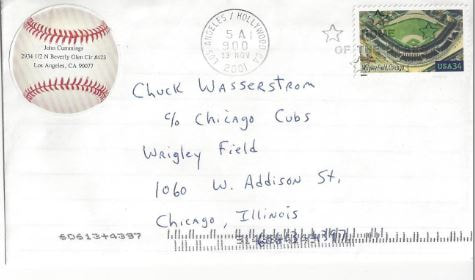
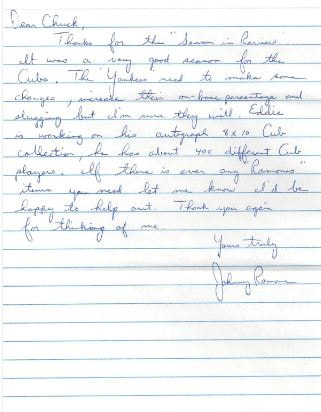
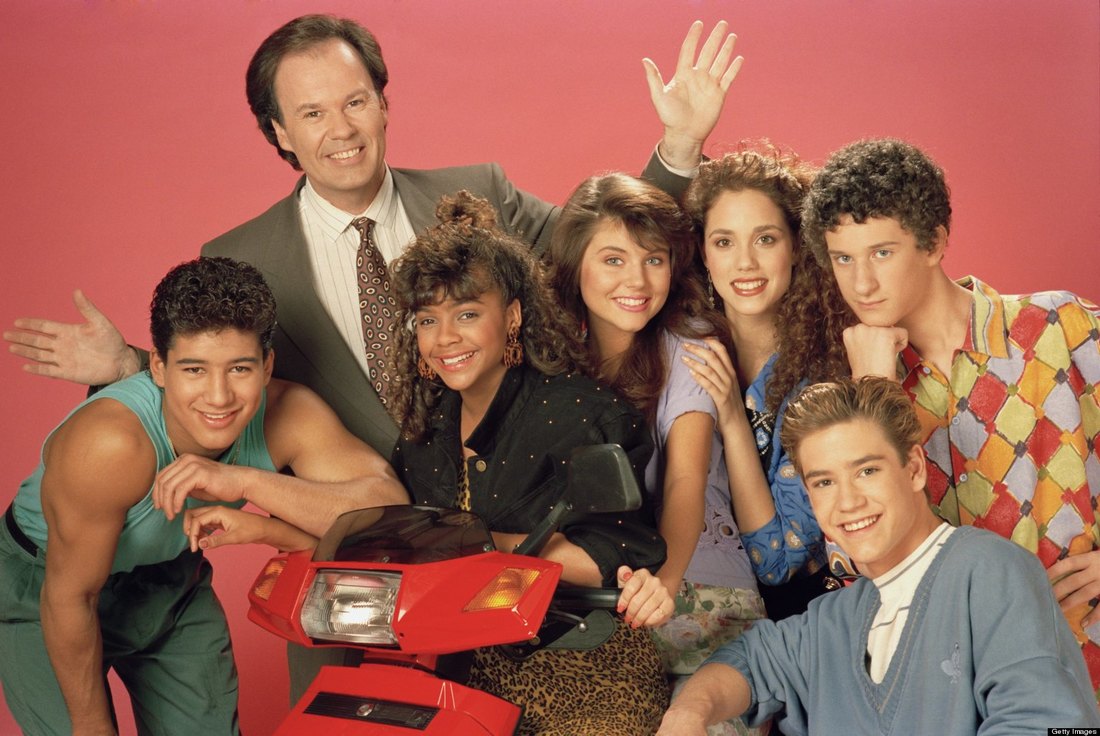
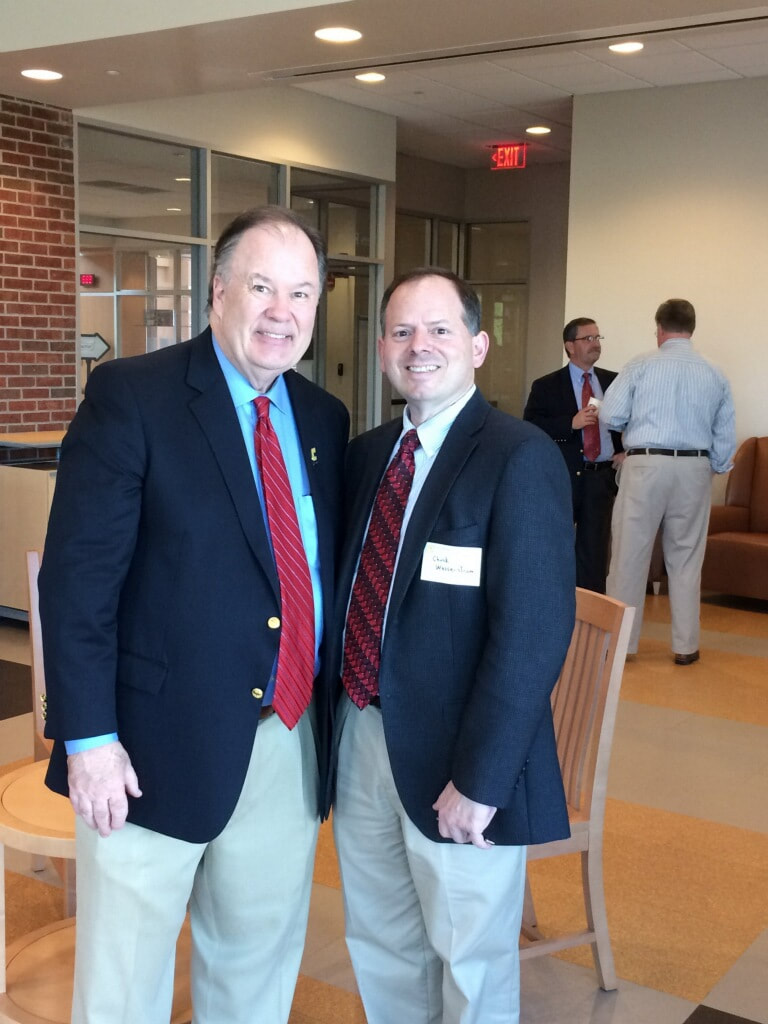
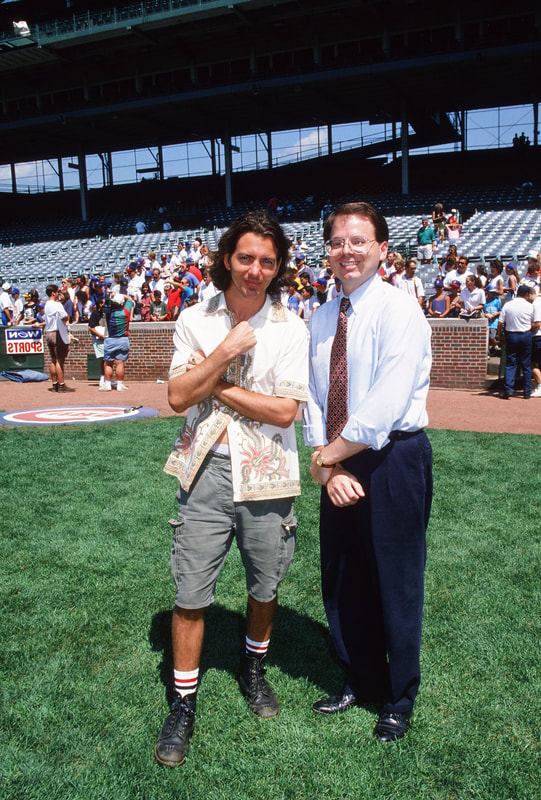
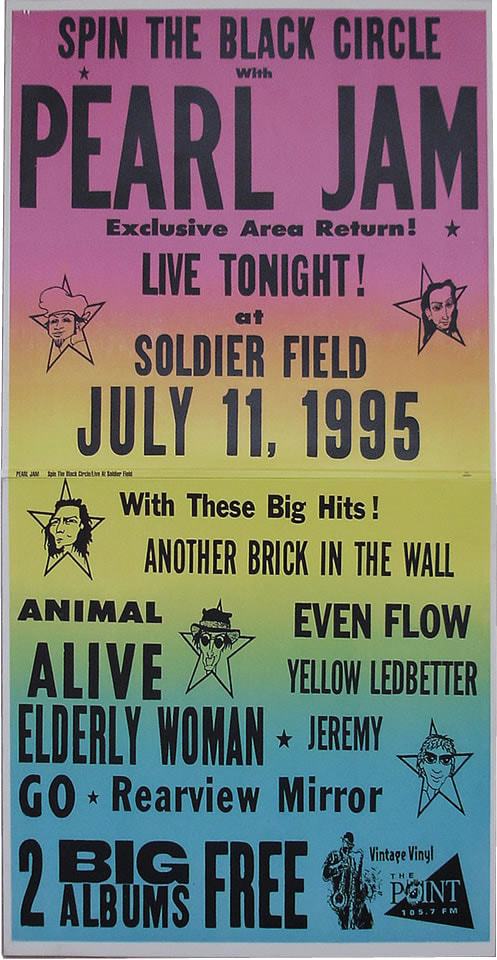
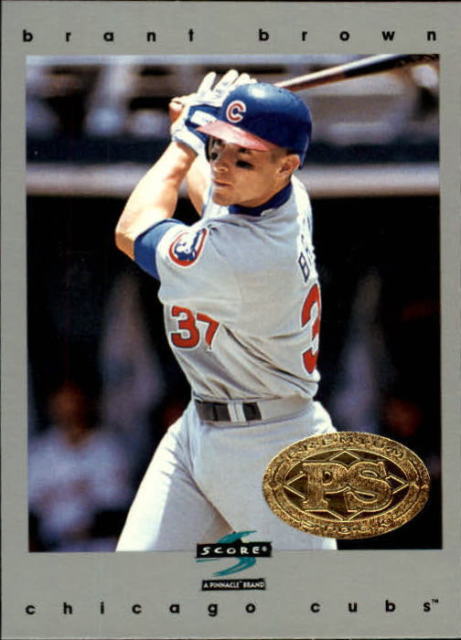
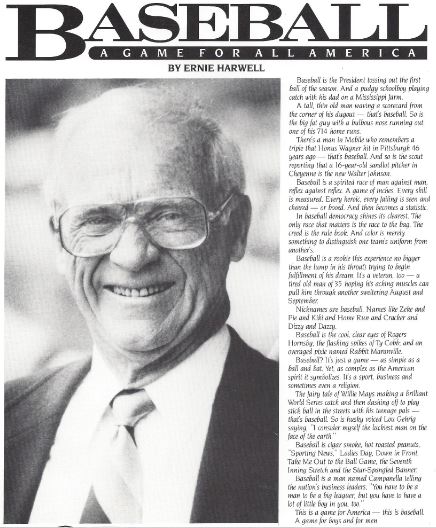
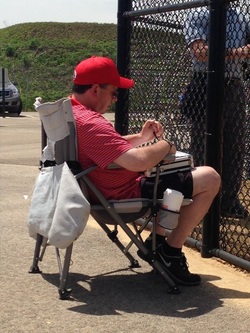
 RSS Feed
RSS Feed